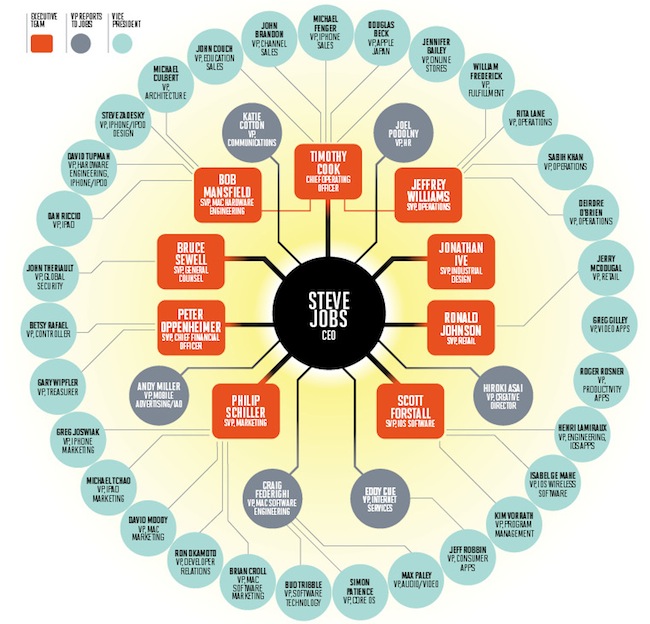In ultima versiune a celebrei publicatii Fortune Magazine exista un articol in care sunt prezentate dedesubturile echipei de conducere a Apple dar si cateva dintre cele mai memorabile intamplari care s-au dovedit a fi decisive pentru directia in care a evoluat compania. Printre cele mai interesante relatari din articol se numara discursul pe care Steve Jobs il tine fiecarui vice presedinte nou numit in functie dar si o intamplare care a avut loc imediat dupa lansarea iPhone 3G si MobileMe.
Difference Between a Janitor and the Vice President sau diferenta dintre un om de serviciu si un vice presedinte se numeste discursul pe care Steve Jobs il tine fiecarui vice presedinte nou numit in functie. Steve Jobs incearca sa le explice vice presedintilor sai care este diferenta dintre scuze si motive dar si cat de importanta este responsabilitatea pe care fiecare VP o are pe umerii sai. El spune o mica povestioara despre un om de serviciu care nu ii curata biroul de gunoi si are drept scuza faptul ca nu a avut cheia. Motivul pentru care omul de serviciu nu a curatat biroul conteaza si e scuzabil insa cand ajungi VP la Apple nu exista scuze si nici motive, raspunzi pentru toate greselile tale. O filosofie destul de interesanta pe care Steve Jobs o impune cu strictete tuturor.
Jobs imagines his garbage regularly not being emptied in his office, and when he asks the janitor why, he gets an excuse: The locks have been changed, and the janitor doesn’t have a key. This is an acceptable excuse coming from someone who empties trash bins for a living. The janitor gets to explain why something went wrong. Senior people do not. “When you’re the janitor,” Jobs has repeatedly told incoming VPs, “reasons matter.” He continues: “Somewhere between the janitor and the CEO, reasons stop mattering.” That “Rubicon,” he has said, “is crossed when you become a VP.
Cea de-a doua poveste are in prim-plan o intrunire ce a avut loc dupa lansarea iPhone 3G si MobileMe din vara anului 2008, o lansare care nu a adus prea multa admiratie pentru compania Apple. La scurt timp dupa lansarea celor 2 produse Steve Jobs a chemat toti angajatii companiei la o intrunire in auditoriul din interiorul campusul Apple din Cupertino. Motivul acestei intruniri a fost faptul ca serviciile oferite prin MobileMe functionau mult sub asteptarile clientilor si ale lui Steve Jobs. Serverele companiei aveau foarte mari probleme in a face fata traficului, existau perioade lungi de indisponibilitate, clientii deveneau din ce in ce mai multumiti insa Apple primea 99$ anual pentru serviciu. Steve Jobs a fost atat de furios din cauza situatiei incat a concediat o parte dintre managerii proiectului si a numit o alta echipa pe loc.
Can anyone tell me what MobileMe is supposed to do?” Having received a satisfactory answer, he continues, “So why the f*** doesn’t it do that? Mossberg, our friend, is no longer writing good things about us.
Apple este o companie care a evoluat enorm de multi in ultimii ani si totul se datoreaza lui Steve Jobs, un dictatator in viziunea celor de la Fortune. In imaginea de la inceputul articolului avem prezentata intreaga structura de conducere a Apple cu Steve Jobs in mijloc, cativa SVP si o armata de vice presedinti care raspund cate unui SVP, Jonny Ive fiind singurul SVP care nu are nici un vice presedinte in subordine. Apple este o masinarie foarte bine pusa al punct care incet incet va ajunge sa fie cea mai valoroasa companie din SUA si din lume.
Pe final iata cateva lucruri pe care probabil nu le stiati despre Apple.
- Just two people wrote the code to convert Safari for the iPad
- At Apple there’s never confusion “as to who is responsible for what.” In Apple’s parlance, a DRI’s name (directly responsible individual) always appear on the agenda for a meeting, so that everyone knows who’s the right contact for a project
- Steve Jobs meets with executives on Mondays to review every important project. On Wednesdays, he holds a marketing and communications meeting
- Jobs’s approach to design and “feel” of a product is shared among the whole company, even if 90% of employees have never met Steve Jobs, Lashinsky writes
- Once a project is nearing completion, Apple spends whatever they need to make it perfect. For example, they contracted the London Symphony Orchestra to record the iMovie soundtracks; they sent a camera crew to Hawaii to film a demo video for a wedding scene; they even staged a fake wedding in a San Francisco church to get a different take on the video, with Apple employees playing guests
- The executive who runs the Apple online store has no control over the photographic material that goes on the website. Apple’s graphic arts department creates and chooses and photographs
- Steve Jobs hired dean of Yale School of Management Joel Podolny to run the Apple University, an internal group also featuring business professors and Harvard veterans that are writing a series of case studies to prepare employees for the life at Apple after Jobs. These case studies focus on Apple’s recent business decisions and internal culture, they are exclusive to employees and taught by top executives like Tim Cook and Ron Johnson






















